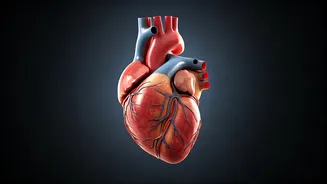What Is Heart Failure?
Heart failure, often misunderstood, arises when the heart struggles to pump enough blood to meet the body's needs. It's not a sudden event, but a chronic
condition that worsens over time. The heart muscle becomes weakened or stiff, impacting its ability to efficiently circulate blood. This can lead to various complications affecting different organs. Factors like high blood pressure, coronary artery disease, and other heart conditions can contribute to heart failure. Understanding the mechanisms behind heart failure is the first step toward effective management and prevention. Early diagnosis is key to prevent further deterioration, and seeking medical attention for any related symptoms is crucial. Awareness of heart health is vital to promote proactive health management and to combat this rising global health concern. This information empowers individuals to take control of their health through early detection and preventative measures.
Recognizing Key Symptoms
Recognizing the symptoms of heart failure is important for early detection and timely intervention. Common signs include shortness of breath, especially during physical activity or when lying down, persistent coughing or wheezing, and swelling in the legs, ankles, and feet. Other symptoms may include fatigue, a rapid or irregular heartbeat, and sudden weight gain due to fluid retention. It's important to remember that these symptoms can vary in severity. If you notice a combination of these symptoms, consulting a healthcare professional is crucial. Ignoring them can lead to further complications, highlighting the significance of early medical evaluation. Prompt diagnosis ensures you can begin the necessary treatment to prevent the condition from worsening. Awareness of symptoms plays a key role in protecting heart health, advocating for the importance of regular check-ups and a healthy lifestyle.
Risk Factors & Who
Certain individuals are more prone to developing heart failure, making it crucial to understand risk factors. Key risk factors encompass conditions such as high blood pressure, high cholesterol, and diabetes, which place undue stress on the cardiovascular system. People with a history of heart disease, including coronary artery disease and previous heart attacks, also face a higher risk. Lifestyle choices, such as smoking, excessive alcohol consumption, and a lack of physical activity, contribute significantly to the risk. Genetics also play a role; family history of heart disease can increase the likelihood of developing heart failure. Additionally, age is a significant factor. The older an individual, the greater the risk, making preventative measures extremely critical with increasing age. Understanding these risk factors empowers individuals to take informed steps towards a healthier lifestyle and to lower their risk of heart failure.
Preventative Strategies Explored
Implementing preventative measures is crucial in reducing the risk of heart failure. Maintaining a healthy lifestyle is a central pillar, including a balanced diet rich in fruits, vegetables, and whole grains. Regular exercise, at least 30 minutes a day, most days of the week, helps strengthen the cardiovascular system. Avoiding tobacco use and limiting alcohol consumption is essential for preserving heart health. Regular monitoring of blood pressure, cholesterol levels, and blood sugar is also important. Managing chronic conditions like diabetes and hypertension minimizes the strain on the heart. Regular check-ups with a healthcare provider can help in the early detection of potential problems. By prioritizing preventative actions, individuals can safeguard their heart health and significantly decrease the risk of heart failure. These steps create a proactive approach to well-being, highlighting the value of healthy habits.
The Importance of Early
Early detection and prompt treatment are critical for managing heart failure effectively. Early diagnosis allows for a range of interventions, from lifestyle modifications to medications, aimed at slowing the progression of the condition and improving the quality of life. The effectiveness of treatment is significantly higher when initiated in the early stages. Delayed treatment can lead to more severe complications, including hospitalization and increased risk of mortality. Seeking medical attention if you suspect heart failure symptoms is vital for getting timely diagnosis and treatment. Regular medical check-ups and open communication with your doctor are crucial for proactive health management. Prompt action maximizes the chances of a positive health outcome and underscores the significance of vigilance and proactive care in maintaining heart health.















